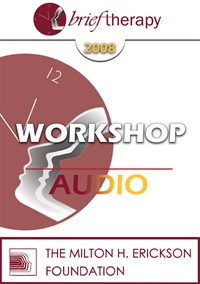
- Average Rating:
- Not yet rated
- Topic Areas:
- Workshops | Trauma | Brief Therapy | Mind-Body | Pain and Healing
- Categories:
- Brief Therapy Conference | Brief Therapy Conference 2008
- Faculty:
- Peter Levine, PhD
- Duration:
- 1:57:13
- Format:
- Audio Only
- Original Program Date:
- Dec 14, 2008
- Short Description:
- It is common to see clients who present with complex arrays of symptoms. These symptoms can be persistent or "mutate" unexpectedly, leaving patient and therapist feeling confused, frustrated and helpless. In this presentation, we will see how states of unresolved stress and trauma can be the underlying force that drives multiple elusive symptoms. These include panic, depression, insomnia, migraines, severe PMS, chronic pain, fibromyalgia and chronic fatigue.
- Price:
- $15.00 - Base Price
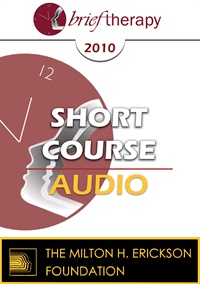
- Average Rating:
- Not yet rated
- Topic Areas:
- Short Courses | Brief Therapy | Mind-Body | Dysmorphia
- Categories:
- Brief Therapy Conference | Brief Therapy Conference 2010
- Faculty:
- Carolyn Sauer, Psy.D. | Marc Oster, PsyD
- Duration:
- 1:26:18
- Format:
- Audio Only
- Original Program Date:
- Dec 09, 2010
- Short Description:
- Physical and psychological recovery is an important concern for patients having had weight loss surgery or other significant body altering events. This workshop will focus on the physical and emotional experience of body dysmorphia, that is not “seeing” oneself as others do. We will address how brief mind-body approaches can aid in resolving these conditions and enhance lasting recovery. Methods will include counseling, social support, massage, yoga, martial arts, and exercise. With Carolyn Sauer and Marc Oster.
- Price:
- $15.00 - Base Price
Tags: Dysmorphia Mind-Body Brief Therapy
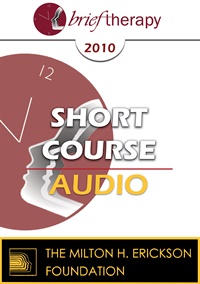
- Average Rating:
- Not yet rated
- Topic Areas:
- Neuroscience | Short Courses | Neurobiology | Brief Therapy | Mind-Body
- Categories:
- Brief Therapy Conference | Brief Therapy Conference 2010
- Faculty:
- Richard Hill, MBMSc, MEd, MA
- Duration:
- 1:30:17
- Format:
- Audio Only
- Original Program Date:
- Dec 09, 2010
- Short Description:
- Breakthroughs in neuroscience and neurophysiology explain how a mindset can alter what is turned on and turned off in the brain and the body. The work of Siegel, Rossi, Bandura, Aronson & Steele and Deci & Ryan act as pieces of a puzzle that explain why therapy can be disrupted by an imposed mindset and how this “winner/loser world” mindset is an unseen barrier to our more natural, creative, interpersonal process. A new, simple brief therapy is presented for lasting, transformational change.
- Price:
- $15.00 - Base Price
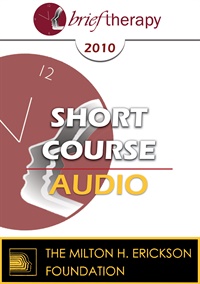
- Average Rating:
- Not yet rated
- Topic Areas:
- Short Courses | Meditation, Spirituality and Yoga | Mind-Body | Mindfulness | Multicultural | Belief Systems | Psychotherapy | Brief Therapy
- Categories:
- Brief Therapy Conference | Brief Therapy Conference 2010
- Faculty:
- Jeanne Hernandez
- Duration:
- 1:38:23
- Format:
- Audio Only
- Original Program Date:
- Dec 09, 2010
- Short Description:
- This workshop explores how the Indian belief system contains ingredients to keep the mind and body in harmony and promote wellbeing. We will explore adding into psychotherapy sessions totem strengths, shaman journeys, medicine wheels, time-frames, respect and gratitude; the circle of life, and symbols as reminders of the “right” path. With Jeanne Hernandez.
- Price:
- $15.00 - Base Price
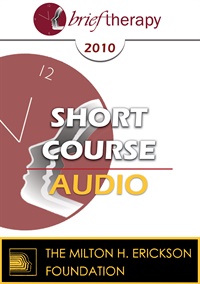
- Average Rating:
- Not yet rated
- Topic Areas:
- Addiction | Short Courses | Brief Therapy | Communication | Mind-Body | Utilization
- Categories:
- Brief Therapy Conference | Brief Therapy Conference 2010
- Faculty:
- Bart Walsh, MSW
- Duration:
- 1:32:27
- Format:
- Audio Only
- Original Program Date:
- Dec 09, 2010
- Short Description:
- This presentation poses a substance abuse treatment which acknowledges and accommodates the personal needs being addressed by substance use, bypasses perceived resistance and employs idiosyncratic psycho-biological learning to achieve a mind-body gestalt complementary to the client’s sobriety. Client self-empowerment and relapse prevention are built into the intervention. This method develops a safe framework for addressing any subsequent mental health themes directly or indirectly related to substance misuse. A simple form of mind-body communication known as ideomotor questioning is employed in this procedure. Because this is a new strategy, fundamental information applicable to all levels of professional experience will be provided.
- Price:
- $15.00 - Base Price
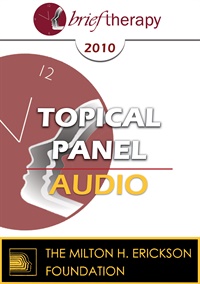
- Average Rating:
- Not yet rated
- Topic Areas:
- Topical Panels | Mind-Body
- Categories:
- Brief Therapy Conference | Brief Therapy Conference 2010
- Faculty:
- Lilian Borges, MA, LPC | Robert Dilts, BA | Stephen Gilligan, PhD | Maggie Phillips, PhD
- Duration:
- 1:02:53
- Format:
- Audio Only
- Original Program Date:
- Dec 11, 2010
- Short Description:
- BT10 Topical Panel 11 - Mind-Body Issues - Lilian Borges, MA, Robert Dilts, Stephen Gilligan, PhD, Maggie Phillips, PhD
- Price:
- $15.00 - Base Price
Tags: Mind-Body
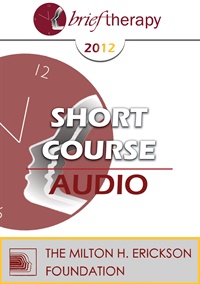
- Average Rating:
- Not yet rated
- Topic Areas:
- Short Courses | Neurobiology | Pain and Healing | Mind-Body
- Categories:
- Brief Therapy Conference | Brief Therapy Conference 2012
- Faculty:
- Anja Ferrari-Malik
- Duration:
- 1:23:38
- Format:
- Audio Only
- Original Program Date:
- Dec 05, 2012
- Short Description:
- BT12 Short Course 06 – Neuromuscular Awareness: A Mind-Body Method to Treat Patients with Chronic Pain – Anja Ferrari-Malik, MD Neuromuscular awareness is a method which focuses on the discovery and development of the skill to perceive one’s own internal bodily sensations and to act upon this awareness to reduce pain. The ability to recognize small bodily changes helps the client to create a new pathway in mind-body connection.
- Price:
- $15.00 - Base Price
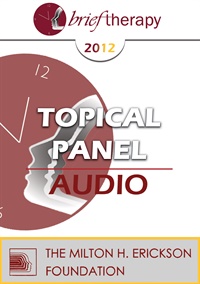
- Average Rating:
- Not yet rated
- Topic Areas:
- Topical Panels | Mind-Body
- Categories:
- Brief Therapy Conference | Brief Therapy Conference 2012
- Faculty:
- Stephen Gilligan, PhD | Peter Levine, PhD | Ernest Rossi, PhD | Ronald Siegel, PsyD
- Duration:
- 1:02:14
- Format:
- Audio Only
- Original Program Date:
- Dec 07, 2012
- Short Description:
- BT12 Topical Panel 12 - Mind-Body Issues - Stephen Gilligan, PhD, Peter Levine, PhD, Ernest Rossi, PhD, Ronald Siegel, PsyD
- Price:
- $15.00 - Base Price
Tags: Mind-Body
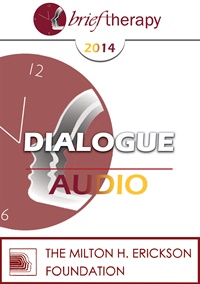
- Average Rating:
- Not yet rated
- Topic Areas:
- Hypnosis | Dialogues | Brief Therapy | Mind-Body
- Categories:
- Brief Therapy Conference | Brief Therapy Conference 2014
- Faculty:
- Michael Yapko, PhD | Ronald Siegel, PsyD
- Duration:
- 1:00:55
- Format:
- Audio Only
- Original Program Date:
- Dec 13, 2014
- Short Description:
- BT14 Dialogue 05 - The Mind and Hypnosis - Michael Yapko, PhD and Ronald Siegel, PsyD Educational Objectives: Given a topic, describe the differing approaches to psychotherapy, and identify the strengths and weaknesses of each approach.
- Price:
- $15.00 - Base Price
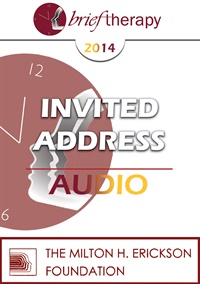
- Average Rating:
- Not yet rated
- Topic Areas:
- Post-Traumatic Stress Disorder (PTSD) | Meditation, Spirituality and Yoga | Invited Addresses | Trauma | Mind-Body
- Categories:
- Brief Therapy Conference | Brief Therapy Conference 2014
- Faculty:
- Bessel van der Kolk, MD
- Duration:
- 1:00:58
- Format:
- Audio Only
- Original Program Date:
- Dec 14, 2014
- Short Description:
- Chronic trauma interferes with self-perception and self-regulation. We will discuss effective approaches.
- Price:
- $15.00 - Base Price
Please wait ...

